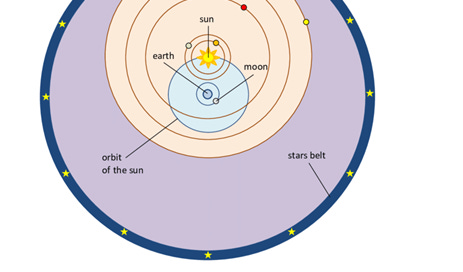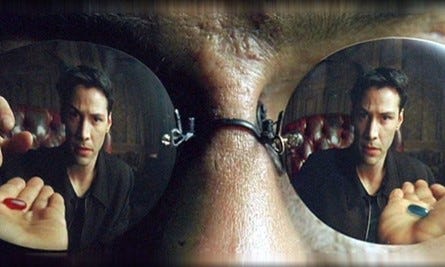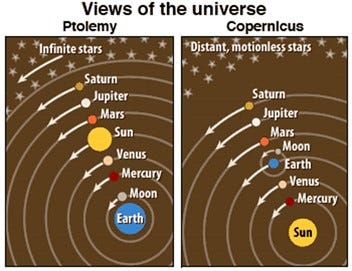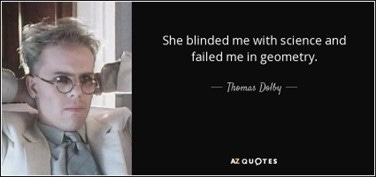Is Heliocentricity a ‘proven fact’? Or is it just more Scientism dogma?
You live in a dream world Neo. Real Science must provide concrete, physical proof, not just math and models.
“Briefly, everything occurs as if the Earth were at rest…” Albert Einstein (“Relativity – The Special and General Theory,” cited in Stephen Hawking’s, A Stubbornly Persistent Illusion, 2007, p. 169)
“There was just one alternative; the earth’s true velocity through space might happen to have been nil.” Henrick Lorentz (1886 paper, “On the Influence of the Earth’s Motion of Luminiferous Phenomena,” in A. Miller’s Albert Einstein’s Special Theory of Relativity, p. 20.)
“The failure of the many attempts to measure terrestrially any effects of the earth’s motion…” Arthur Eddington (Eddington, The Nature of the Physical World, 1929, pp. 11, 8)
[Author’s note: I don’t have a bias in this domain or associated arguments. I am Socratic in that I believe you follow evidence and then decide what makes sense. This Socratic principle is absent in science, hence ‘Scientism’.]
Introduction
Scientism has a few definitions. In essence we can say that Scientism is the blind religious belief in the abstraction called ‘science’ and its dogmatic claims. We saw this with the Coronavirus plan-demic and hear it every day with the inane cult of ‘Climate change’. Scientism demands that you suspend critical thinking skills and the world of the 5 senses and submit to the Church of ‘The Science’ and its gospel. The reality is that much of what we have been taught as ‘Science’ is simply wrong. An example is ‘the proof’ that heliocentricity is a fact. This is simply a lie. When you start to analyse the myth of heliocentricity, many more myths begin to implode.
Copernican Principle Defined
Heliocentricity as a theory is encased in what is now viewed as a ‘law’ or principle. This principle is used by everyone in ‘science’ as a starting point. Few if any question whether the principle comports with reality.
In physical cosmology, the Copernican principle states that humans, on the Earth or in the Solar System, are not privileged observers of the universe, that observations from the Earth are representative of observations from the average position in the universe. Named for Copernican heliocentrism, it is a working assumption that arises from a modified cosmological extension of Copernicus' argument of a moving Earth.
Is there an uglier, more debased and anti-anthropic ‘principle’ than this one?
Is there any proof to grant it ‘principle status’?
A bold Thesis
Very few people on this planet understand that in reality, no one in all of history has ever proven that the Earth moves in space. From Aristarchus to Galileo no proof exists, just theories. Can you imagine this? We simply accept what we are told to believe. Isn’t this the definition of Scientism? Blind belief. For example, everyone ‘knows’ the famous but apocryphal example of the ‘persecuted’ Galileo during the 17th century, telling heliocentricity truth to unreasonable, fanatical, insipid, ignorant, superstitious, obnoxious, uneducated, dirty, toothless, priests and monks. Hyperbolic and entirely wrong.
Anyone who has studied this saga knows that the irascible, ego-centric Catholic was never persecuted, was in fact funded by the Church, feted, given 2 days of public honor and festival in Rome, yet when it came to heliocentricity possessed no proof for his assertions. The better arguments are found with the monks and Jesuit astronomers. What Galileo purported as proof, would today be dismissed with a chuckle and grin. But he was quick at self-promotion, peacock strutting, slander and ridicule, a sure method not to win friends and allies. Myths die hard. We will look at the apocryphal Galileo case later always used by ‘The Science’ as a cudgel against the ‘religious’ as if the worship of ‘Science’ is not a religion.
It will surprise many to learn that the Copernican model, including the ideas of Copernicus and Galileo, has more to do with philosophical worldviews than with hard science. When you deep dive into the data and sources, you are shocked to uncover the Potemkin, Wizard-of-Oz reality of the ‘Copernican Principle’, pronounced as yet another ‘Scientific Law’ that you must obey, whether or not it is true, and whether or not you actually understand what it means.
Worldviews
Modern ‘science’ is suffused with philosophical worldviews. Modern scientists openly admit that heliocentrism is merely the preferred model of cosmology, a choice made purely on philosophical grounds, not scientific ones. As Stephen Hawking queried,
“So, which is real, the Ptolemaic or the Copernican system? Although it is not uncommon for people to say that Copernicus proved Ptolemy wrong, that is not true….one can use either picture as a model of the universe, for our observations of the heavens can be explained by assuming either the earth or the sun to be at rest.” (The Grand Design, Stephen Hawking and Leonard Mlodinow, 2010, pp. 41-42)
Hawking and modern ‘science’ philosophically use heliocentricity as their departure point, premised in part on an incorrect belief that the Copernican system is ‘simpler’ than the Ptolemaic. This often-cited assertion is simply untrue. To wit, the Copernican-Kepler model contains between 48-90 epicycles, or small, out-of-elliptical movements, digressions and retrograde motions, depending on how you want to count them. Ptolemy’s has 40. Ptolemy’s system is thus simpler and more elegant and as any astronomer and physicist past or present has admitted, admirably explains celestial phenomena and movements. It is not an archaic model from half-naked idiots and illiterates.
19th century disproof’s
(Tycho Brahe’s Tychonic system which incorporates the Ptolemaic and Copernican systems and explains equally well the observed ‘phenomena’)
In previous posts we discussed many 18th and 19th century experiments which disproved the moving Earth hypothesis. All of these men were avid ‘helio-centrists’ and were ‘shocked’ by the null or negative result. You won’t get this information from ChatGPT but you can read it in their writings. ‘It cannot be true!’ they moan. ‘We know it moves’ they proclaim.
Most people have never heard about these experiments, so we will list and summarise the most relevant here:
In 1810, François Arago sought to measure how light particles were refracted by a glass prism in front of a telescope. He predicted that there would be different angles of refraction due to the different velocities of the stars and the motion of the Earth at different times of the day and year. Contrary to his expectation, he found no difference in refraction between stars, time zones, or seasons. All that Arago observed was normal stellar aberration – as evidenced previously by Bradley (Persson 2011). Bradley’s stellar parallax of 1725 can be explained by both helio-or-geo centricity. It does not prove the mobility of the planet. Arago’s failure was a huge shock to heliocentricity.
Arago also observed one star through a telescope for the whole course of a year. In the heliocentric system the Earth will move toward the star and then move away. Arago reasoned that the focal length of his telescope would need to change when viewing the star since the limited speed of light must be compensated to accommodate both a receding Earth and an advancing Earth at six month intervals. To his utter astonishment, Arago did not need to adjust the focus to see the star clearly. This clearly told him an avowed heliocentricist that the Earth was immobile (François Arago, “Mémoire sur la vitesse de la lumière”, 1810. Académie des sciences (Paris)).
In 1851 Armand Fizeau (1821-1896), attempted to prove Fresnel’s “drag” theory to procure a physical, not a theoretical or mathematical, answer for Arago’s results. Fresnel had attempted to explain Arago’s failure by describing an ether entrained around the Earth, which moves with the Earth and prevents a mechanical calculation of its movement. Fizeau’s thesis was that if we on Earth are moving through ether, then the speed of the light in a water tube will be increased with the speed of the Earth’s motion (30 km/sec). But the outcome was quite different than what Fizeau expected. The speed of light was not a sum of the velocity of the light added to the velocity of the Earth. Rather, the only effect Fizeau found on the speed of light was that which was induced by the water’s refractive index. Again the Earth’s mobility was not detected. This experiment had a great impact on Einstein.
In 1868 the Dutchman Martinus Hoek, an astronomer at Utrecht, performed another type of experiment, by creating a variation of Fizeau’s experiment in order to test the nature of light. Hoek used an interferometer arrangement of a monochromatic light ray from a source of light, divided by a (weakly silver-coated) glass plate. Even if the whole apparatus were at rest in the ether, such an arrangement would give rise to interference fringes in the telescope. To his surprise, Hoek noticed no significant difference in the fringes, at least not in accord with an Earth moving at 30 km/sec. He simply confirmed what Michelson and Morey would also witness in 1887 – the Earth was immobile.
In 1871 Sir George Biddell Airy set out to record the change in the direction of light passing through a refracting medium that is moving. This followed on from Fresnel (1818) and Fizeau (1851). His experiments are replicable. Airy demonstrated that stellar aberrations occur even when a telescope is filled with water and measurements are taken from the moving Earth (moving medium). This is not what the theory predicts. As with Fizeau, the Airy experiments suggest that light does propagate through dielectic or poorly conducting matter but at a reduced phase velocity. The stellar aberration hypothesis seemed to be disproven, leading to the conclusion that the Earth is immobile.
In 1872 Elie Nicolas Mascart devised an experiment in which he could detect the motion of the Earth through ether by measuring the rotation of the plane of polarization of light propagated along the axis of a quartz crystal. Polarization is a phenomenon of white light, which propagates along the axis of forward movement at many different angles but is reduced to just one angle. Mascart set up the experiment so that if the Earth were passing through the ether at the expected clip of 30 km/sec, then the light’s plane of polarization would be affected. Mascart found no such results. The Earth refused to reveal mobility.
In 1881 the famous German physicist A. Michelson, using a highly sensitive interferometer tried to refute the Airy experiment but much to his amazement, failed. He would try the same experiment again in 1887 with the American Morley – and produce the same failed result. With lament he wrote, “This conclusion directly contradicts the explanation…which presupposes that the Earth moves.” (in, “The Relative Motion of the Earth and the Luminiferous Ether,” American Journal of Science, Vol. 22, August 1881, p. 125).
Michelson found no evidence of the Earth’s mobility.
Oliver Lodge tried to rectify Michelson’s failures and conducted experiments in the 1890s seeking evidence that light propagation was affected by being near large rotating masses but found no such effect. Lodge still believed the ether existed but that it was difficult to find. His 1925 book ‘Ether and Reality’ provides an overview of his experimental evidence for an ether, where he maintains that the ether accounts for the movement of light, gravity and even heat across a vacuum. He did however refute the stellar aberration concept (Hunt 1986). If the ether does exist Einstein’s STR is invalid.
The above disprove the Sun-Worshippers precious theory. But you will never hear about them. In fact ‘The Science’ flips them around as proof of STR and heliocentricity. Lies are now truths.
‘It must move!’
According to ‘The Science’, the 1887 Michelson-Morley experiment purportedly ‘proved’ that the ‘ether’ or ‘medium’ in space and around the Earth, did not exist. The ‘ether’ was and still is essential to the electro-magnetic theory of Maxwell and the calculations of Lorentz purloined by Einstein for this theory of Relativity. In reality Michelson and Morey did not disprove anything about the ether (see here), but rather demonstrated that the Earth did not move. This failure was a crucial factor and motivator in Einstein’s decision to concoct ‘Relativity’ and save heliocentricity (a layman’s introduction to STR is here).
“The data were almost unbelievable… There was only one other possible conclusion to draw — that the Earth was at rest.” Bernard Jaffe (in, Michelson and the Speed of Light, 1960, p. 76. Jaffe adds this conclusion to the above sentence: “This, of course, was preposterous.”)
The easiest explanation (for the Michelson-Morely failure) was that the earth was fixed in the ether and that everything else in the universe moved with respect to the earth and the ether…. Such an idea was not considered seriously, since it would mean in effect that our earth occupied the omnipotent position in the universe, with all the other heavenly bodies paying homage by moving around it. (James A. Coleman, Relativity for the Layman, p. 37).
Both statements from Jaffe and Coleman are philosophical. ‘The Science’ will not tolerate the Earth being in a preferred location. In fact, all the evidence points to the reality that the Earth is at the center of the Universe, and which has led many ‘modern scientists’ into despair and vitriol, raging against this ‘horrific and terrible idea’. Worldviews inform almost all of ‘science’.
The 1887 experiment was tried again by Morley and by many others with the same result; namely that the apparent velocity of the Earth through the ether was zero. Early 20th century modern physics was therefore in a quandary. ‘The Science’ could reinvent physics with novel concepts and formulas to keep the Earth moving, or it could admit that the Earth was motionless and heliocentricity bunk and toss out 400 years of what is best described as circular reasoning.
Save the phenomena!
‘The Science’ decided to keep the Earth moving. This proves yet again the truism from the French sage and physicist Pierre Duhem who detailed in his opus, ‘Save the Phenomena’, how modern ‘science’ interprets data to fit into pre-existing models and conceptions to explain and ‘save’ the observable phenomena. In other words, torture observational data to fit the models. When data showed that the Earth did not move, the industry of science mobilized to ‘save the phenomena’ and this is where Einstein enters the frame (Lincoln Barnett, The Universe and Dr. Einstein, p. 44.)
To save face and the phenomena, Einstein was forced to create the fantasy world of relativity (its demerits are discussed in many previous posts) and upend real science to keep Copernicus enthroned in the ex-cathedra chair in the Church of Science. It wasn’t that the data pointed objectively to the truisms of the Copernican theory, it was that Einstein created and in fact invented the ‘Copernican Principle’ to save 500 years of ‘science’.
Regardless of what OpenAI emits, Einstein overturned observational science through his discredited and poorly understood Special Theory of Relativity. Physical proofs went out. Maths and arcane models came strutting in. It wasn’t as if Einstein was a great inventor, practitioner, or experimenter. He was none of those things.
Einstein did not create any physical proofs for his theories. They were abstract thought experiments intended to disprove the results of Fizeau, Airy and Michelson; to save Newton’s theories, and align the complex maths of Maxwell and Lorentz with an ether-less universe and a mobile Earth, supposedly moving through the ‘vacuum’ of space at 30 km / sec. Einstein was always in pursuit of some grand meta-model which he called the ‘unified model’ to explain everything. He failed. His key unproven assumption and starting point was Earth mobility and heliocentricity.
In general, STR has no proof to support it. If the ether exists as GTR states, STR is demised. If the speed of light is not consistent in space as it is now believed, STR is rubbished. If the space-time 4th dimension is in reality a physical impossibility STR is destroyed. If the curved universe theory, conjured to make Newtonian equations balance is in reality false, because the universe appears to be a flat disc, STR is gone. GPS satellites, often forwarded as a proof of STR, use inbuilt geocentric assumptions within their software code to triangulate positions. STR has nothing to do with global positioning systems, ChatGPT propaganda notwithstanding. What we have therefore in lieu of proof, is marketing offered by the massive industry which has mushroomed around the Big Bang and Relativity.
He blinded me with models
The entire impetus of Einstein’s work was thus metaphysical and philosophical. It was not based on observational science, nor on the ‘scientific method’. For Einstein and fellow travelers, it was metaphysically impossible that Copernicus and heliocentricity could be wrong! A theory was desperately needed to support 400 years of propaganda. As Herbert Dingle, one of the foremost experts in history on Einstein’s theories, wrote and proved, no physical evidence exists to support the Special Theory of Relativity. How many people know this? In the age of ‘thriving democracies’ you are not even allowed to discuss it.
Despite its obvious issues, STR made Einstein the great prophet of truth and scientific insight and ever since, he has been venerated as a demi-god, a scientific personality to follow and worship. A divinely inspired apostle in the Church of ‘The Science’. Einstein’s most famous acolyte and apologist Stephen Hawking (or whoever was the actual spokesperson for Hawking), has also attracted the same cult devotion and religious observance.
STR and GTR are simply assumed by Hawking and other devotees as starting points, since ‘they must be true’. You see this within the Big Bang theology (criticised here) in which all data is tortured and flayed to fit into a model that is simply wrong. However, we all know that it is unlikely that a student will pass University, an associate professor could attain tenure, a project will get funding, or a researcher will get published, if they dare question the dogma of physics and its Scientism. This is not ‘science’ but a cult, deformed by the corruption of money and power, a massive $50 billion or more per annum industry, built on faith with an egoistic belief that ‘The Science’ has a divine right to rule. Thou shall obey Prophets and Saints, Albert and Stephen.
Bottom Line
Let us pretend that we are Neo and we open our minds and imagine for a moment that heliocentricity is a theory without proof. Push it further and discover that there is an avalanche of observational data proving that it might well be wrong. Let that thought settle and meditate on it. Then consider the massive scale of embarrassment and loss of credibility ‘The Science’ would suffer. 500 years of propagating one of the biggest frauds in history would be ascribed to a domain which spends billions every year advertising its holiness, its infallibility, its redemptive mission to save mankind from darkness and usher in progress and light.
This humiliation would absolutely eviscerate the reputation of Western science and never allow it to recover. Copernicus, Newton, Darwin, Einstein, Hubble, Hawking, and scores of other Apostles from the Church of ‘The Science’ would be mocked, strung up, destroyed, and buried. Entire paradigms, including endless time, Big Banging and Evolution would collapse into dust.
If Copernicus, basing his theory mostly on philosophy and not evidence was wrong, how could modern ‘science’ ever face the world again? How could ‘The Science’ ever regain a shred of credibility if it were forced to admit such a massive error about one of its most sacrosanct and fundamental beliefs?
The next post will explore why heliocentricity is a theory looking for proof. If you dare suggest this you are of course a ‘denier’, ‘anti-science’, a ‘nutbar’, a ‘flat earther’ and a ‘clear danger to our thriving democracy’. The same charges are applied against those who see through the Corona Medical Nazism, or the Eco-Climate Fascists. It is good company to keep.
“…nor has any physical experiment ever proved that the Earth actually is in motion.” Lincoln Barnett (in, The Universe and Dr. Einstein, 2nd rev. edition, 1957, p. 73)
“Thus, even now, three and a half centuries after Galileo…it is still remarkably difficult to say categorically whether the earth moves, and, if so, in what precise sense.” Julian B. Barbour (in Absolute or Relative Motion, Cambridge University Press, 1989, p. 226)
===Related posts
An overview of Special Theory of Relativity (STR)
An introduction to the underlying maths of STR
Key scientists and actors within the STR domain
James Webb Telescope observations which refute parts of STR and the Big Bang
Herbert Dingle’s unanswered clock paradox and the inherent contradiction within STR
Scientism and Special Relativity, the Paradigm is ending
From Aristotle to the Big Bang
(quite a few posts about the scientism of the Big Bang, just use the search icon)









Author’s note: I don’t have a bias in this domain or associated arguments. I am Socratic in that I believe you follow evidence and then decide what makes sense. This Socratic principle is absent in science, hence ‘Scientism’. Exactly, agreed. For humble me, all human knowledge is contingent and heuristic and we should always be ready to to update it in the light of new evidence or experience. I can think of very few examples of anything I think is actually true. Given this state of affairs it is surely best to see knowledge as a form of "best practice'' and base its value upon its utility. And all this is why I prefer philosophy to science as no good philosopher will be so presumptuous as to claim absolute truth. I liked your account of the trial of Galileo where you stressed that the court had an excellent point and that he was stubborn and intransigent. Durant makes similar points in his essay on Galileo (on YT). All Galileo had to do - according to Durant - was accept his view was hypothetical. So who here was actually claiming infallibility? And in addition to the above - perhaps a simple review of what we think is true and why and what we have been told but have no experimental evidence for. Do we think the earth revolves? Do we think the moon orbits the earth? Do we think the earth and sun move around each other? Do we think the earth and sun and planets move through the universe? Just what exactly do we think we know?
Excellent - one of your best so far and looking forward to part two.